Owner and winemaker of his family estate in Bandol: “I was regarded as the ‘son of’ for a very long time”.
The 22nd interview in Le Figaro Vin’s series finds us once more in Provence, at Château de Pibarnon, a southern jewel which has been raising the profile of the Bandol wine region for nearly half a century. We are here to meet Éric de Saint-Victor, #29, a second-generation owner who, after many years in the shadow of his parents, has firmly established his place at the zenith of the appellation.
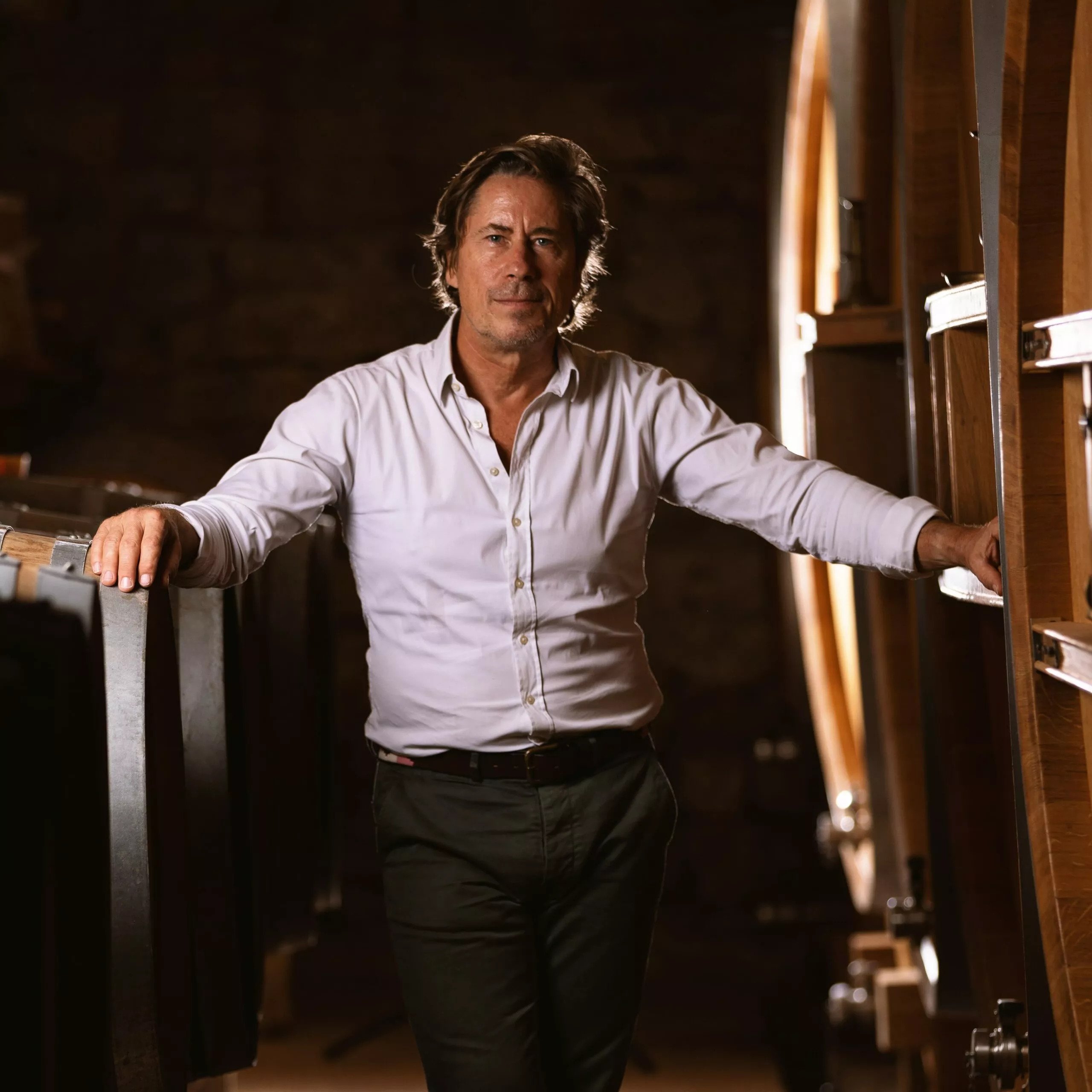
With a mere three hectares acquired in 1977, in an appellation which formerly struggled to get on the map, Château de Pibarnon began life as a genuine gamble. “My parents purchased what was within their means,” acknowledges Éric de Saint-Victor. “My father saw that you could do something extraordinary in Bandol. They created everything from scratch.” With its two red wines, two rosés, and one white, the estate now ranks among the most sought-after in France and plays a major part in the growing reputation of the Bandol wine region on both national and international stages.
Le Figaro Vin: How does it feel to be crowned a winemaking champion?
Éric de Saint-Victor: It reminds me of something my father used to say when he heard himself described as the best: “I am one of the two best, but we don’t know who the other one is!” We should bear in mind that in the 1980s and 1990s there was a competitive atmosphere between the estates, who were in a race to get results and win attention. A great wine had to be powerful and intense. That was the norm, especially in Bandol. When it comes to me, I am really fortunate to have had the time to develop my expertise and to benefit from well-established vines, so today, above all, the challenge is with myself, in the pursuit of craftsmanship rather than competition. It makes me very happy to be regarded as a champion, but just like with sailing, you have to put your own boat in order before taking on others.
Have you been training for long?
At the outset I learnt alongside my parents. My father taught me about winemaking, my mother about the business side of things. The training never stops, and you are always taking risks.
Who is your mentor?
Alain Brumont (of Château Montus and Château Bouscassé in the Southwest, ed.) who visited the estate in 1989. He was the first winemaker of note to treat me as an equal. I was regarded as the “son of” for a very long time, whereas he spoke to me as one winemaker to another, which boosted my confidence. I think that more than having a mentor, what is really valuable is to analyse the pathways taken by winemakers whose wines you love and to see how these can be understood through their wines. In this respect tasting is key to analysis. I always say that Pibarnon’s first customer is me!
Is wine a team sport?
Of course. We have a talented team here and the working atmosphere is pivotal. I don’t want a team of pruning shears; I want human beings. Everyone brings something to the table, and I favour consensus and collective decision-making.
What is the key to making a good wine? The terroir or the winemaker?
We are merely part of the terroir, it is our job to give it meaning, to interpret it, whereas the substrate is immutable.
To what do you owe your success?
First and foremost to the terroir. Here in Bandol we have a unique geological layer, a Triassic limestone soil which is exceptional, enjoys excellent hydromorphology, and produces grapes with quite intense tannins.
Is your family proud of you?
I think so, even though I have been an “orphan” since the ages of 49 and 50.
Your favourite colour?
I like white, although it’s hard to choose. I roll with the seasons. My favourite style of wine is the one that takes me into its own world. I don’t look to be amazed, I go for depth and the experience of discovery.
Your favourite grape variety?
Mourvèdre, which has a fascinating, very romantic character. It’s a Don Quixote, untamed and freethinking. It’s a grape variety that requires freedom, it’s not a circus animal: you can’t put it in a box, you have to know how to guide it.
Your favourite wine?
Because of my genes it has to be Le Rouge du Château, which is Pibarnon’s standard bearer, combining all the attributes of the estate. In our southernmost environment we contrive to produce something fresh, which makes for an astonishing paradox on the palate. These are wines of light rather than wines of heat.
Your favourite vintage?
No vintage is exactly like another. I really liked 2019, for which we went out on a limb.
If your wine was a person, who would it be?
A character from fiction, but intellectually rich, a bit like Steve McQueen with a feline side. It’s a wine that sometimes shows its claws but has a smooth and solitary side.
What are the best circumstances in which to taste your wine?
When the wines are young, over a meal, when they have aged, in a more contemplative way, especially after 25 years of ageing. The latter are more meditative wines, producing more heightened states of intoxication, whereas the former make the conversation flow.
Who is your strongest competition?
Drought.
What is your greatest trophy?
My father won six gold medals at the Concours Général Agricole de Paris. He exuded a special charm and had built up some very strong relationships with sommeliers and winemakers. In 1993 I began to take over responsibility for winemaking, then, a few years after that, I entered a competition in England. I gave that a shot because in France I would have been afraid of only getting bronze! Neither Bandol wines nor Mourvèdre were specified on the entry form, so I competed in the “others” category and six weeks later I was awarded a prize. This story aside, the greatest trophy for me today is to share a tasting with a great sommelier and to see in his eyes a growing understanding which reveals a sense of experiencing something new.
Who would be your ideal successor on the podium?
Someone who could take my place while showing true independence through their own take on things. Someone who could build on their experience on the estate and find their own voice: they would be the ideal successor.
Fifth-generation winemaker of this renowned family estate: “My first internship supervisor was Aubert de Villaine, of Domaine Romanée-Conti”
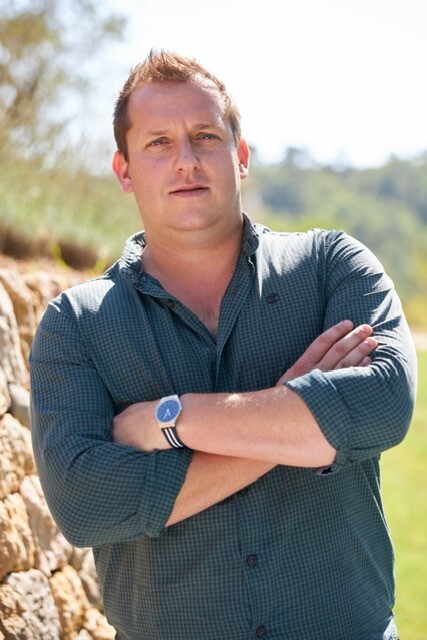
For the 16th interview in Le Figaro Vin’s series we head south down the Rhône Valley to one of its finest appellations, Châteauneuf du Pape, where we meet César Perrin, #35. Vintage after vintage he and his family devote themselves to their labours with total commitment.
An Eden in the Rhône Valley, surrounded by hills, vines, and olive trees, Château de Beaucastel is widely recognised as one of the most inspiring estates in Châteauneuf du Pape. While its origins date back to the 16th century, it was in the early 1900s that Pierre Perrin took it over. His son Jacques proved to be a true master of the winemaking craft, capable of taming the wilfulness of Grenache, while his innovative spirit led to the estate’s early adoption of biodynamic viticulture at the start of the 1970s. Today César is part of the fifth generation to carry the torch, alongside eight other members of his family, made up of his parents, uncles, brothers, and cousins. Through each successive vintage we have found ourselves utterly enchanted by the supple grace of their reds, perfectly balanced between the intensity of the fruit, the smoothness of the tannins, and an aromatic complexity which just keeps on growing deeper.
Le Figaro Vin: How does it feel to be crowned a winemaking champion?
César Perrin: I don’t think of myself as a champion. We are, more than anything, champions for our generation, continuing the achievements of our parents, grandparents, and great-grandparents before us. We have to be champions in preserving and passing on our inheritance, for we are all just passing through. It is always gratifying to know that our wines are tasted all around the world.
Have you been training for long?
Winemaking is a vocation, so we all devote a great deal of time to it, much to the detriment of our families. We train every day from a very young age. Whether in the cellar, among all the smells, or playing Le Nez du Vin and trying to recognise the fragrances, it is a little like The Drops of God. Already with my daughters, aged three and two, we taste different fruits, such as unripe cherries.
Who is your mentor?
I would say my father, who initiated us. Apart from him it would have to be my first internship supervisor, Aubert de Villaine, in 2008. He told me something that has always stuck with me: “Here at Romanée-Conti, no matter what your task is, whether it takes you an hour, or a day, or a month, you have to do it perfectly.” Ever since, I have tried to do my best on a daily basis.
Is wine a team sport?
It is for me, but most importantly wine is made to be shared and is, in that respect, a team sport. Wine is, above all, a moment for sharing, a shared emotion. You can go fast on your own, but together you go further.
What is the key to making a good wine? The terroir or the winemaker?
A great wine requires four elements: the terroir, the vine selected for planting, the climate that supports it, and the man who tends that vine. It is a combination of the four.
To what do you owe your success?
To my grandfather Jacques and my grandmother Marguerite, who turned Beaucastel into a jewel. They were pioneers, going organic in the 1950s and biodynamic in the 1970s. In rejecting the incursions of chemistry they were true visionaries.
Is your family proud of you?
I hope so. In any case, that is the great benefit of working as a family: we are very candid with each other and there is a real honesty between us. That only adds to the pressure and makes it even more imperative that we ensure our family can be proud to represent our wines.
Who is your biggest supporter?
Château de Beaucastel Châteauneuf-du-Pape Hommage à Jacques Perrin, which is our finest wine.
Your favourite colour?
Red.
Your favourite grape variety?
Mourvèdre. My grandfather was very fond of it. The grape variety was introduced to Beaucastel in the early 1930s. My grandfather went to school with Lucien Peyraud of Domaine Tempier, which is still, in my view, the greatest of the Bandols. I have noticed that the great Bandol wines were always made in the northernmost part of that appellation, while here in Châteauneuf we are at the northern boundary of our appellation. That explains why we brought Mourvèdre, which is an archetypal Bandol grape variety, to our own terroirs.
Your favourite wine?
Our whites. We have relatively very few of them, only eight to ten per cent of our production. But our Roussanne Vieilles Vignes is my favourite.
Your favourite vintage?
My first, 2012.
If your wine was a person, who would it be?
It would be a countryman.
What are the best circumstances in which to taste your wine?
With friends.
Have you ever thought about chemically enhancing yourself, or your wine?
No, quite the opposite, we have to preserve the distinctive quality of each vintage, and take what nature gives us. Nature is not always congenial, but it is what it is.
For what price would you be prepared to sell your estate?
Everything has a price, apart from family. So the question will never arise, since we want to pass it on forever.
Who is your strongest competition?
The weather.
Which competition do you dread the most?
Pruning the vines, which is such a key moment in their development.
What is your greatest trophy?
My grandmother’s pride. When she made family meals, she used to say to us: “When I am gone there is a case of wines with vintages made by me and your grandfather. I want you to open it together.” They were old magnums from 1950 and the family drank them together. It was a uniquely special experience.
What has been your most innovative strategy in the vineyard and in the cellar?
That goes back to my grandparents, with their decision to reject chemical products after the war. That has allowed us to maintain a unique ecosystem, with soils that have never been touched by chemicals.
Who would be your ideal successor on the podium?
A member of the Perrin family.
Owner and winemaker of Château La Calisse: “You have to be tuned in to your terroir”.
The 11th in Le Figaro Vin’s series brings us back to Provence where Patricia Ortelli, #40, creates her exquisite organic wines. Here she shares her vision and her deep love for her vocation, which she has pursued for the last 30 years. 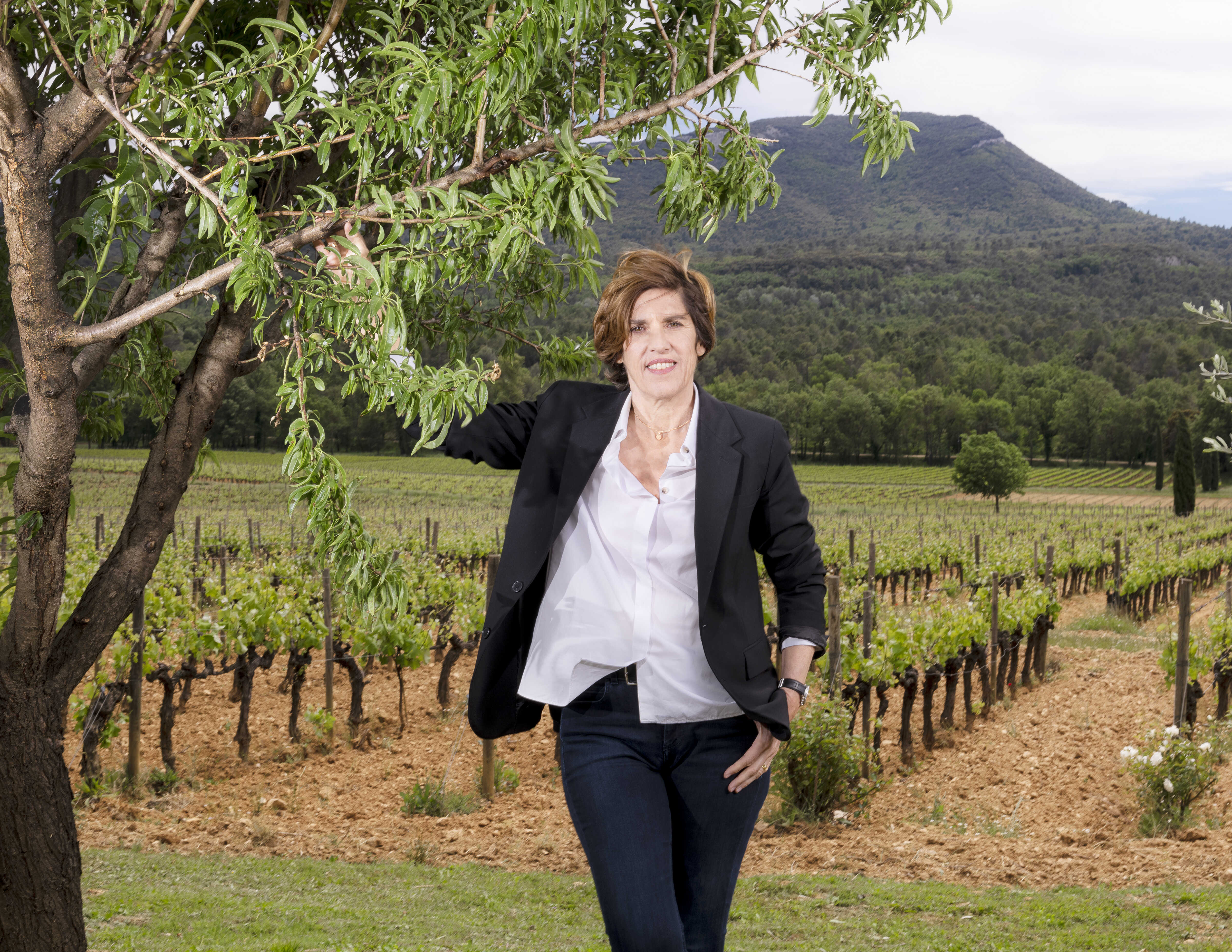
A pioneer of organic viticulture in Provence, Patricia Ortelli works her 12 hectares of vines with passion and respect for the environment, entirely eschewing weedkillers and insecticides. Château La Calisse benefits from an exceptional location, with its terroir of stony limestone soil where the vines flourish at an altitude of 500 metres, which protects them from sun damage. This terroir produces wines of extraordinary vivacity, ranging from a delicate white to a refined red by way of the palest of rosés.
Le Figaro Vin: How does it feel to be crowned a winemaking champion?
Patricia Ortelli: It gives me a feeling of intense happiness, in the light of all the love that, to this very day, I have devoted to my wines.
Have you been training for long?
Only for 30 years! It began when I raised my hand at an auction and ended up owning an abandoned vineyard. We had to start from scratch, completely replanting and rebuilding, levelling the ground and constructing the cellar. That was when I chose to go organic, becoming a trailblazer here in Provence. We started out on land that had never been touched by chemicals.
Who is your mentor?
My oenology professor, who was a big help, and very enthusiastic about this terroir, in the northern part of Provence. This was at a time when investors were focused on the south, in order to be close to the sea, whereas here we are 500 metres above sea-level.
Is wine a team sport?
Yes, one hundred per cent. In my teams we are all on equal terms and we face the day’s challenges together, especially at harvest. One of the joys of this job is that you never know what to expect. You have to stay on your toes. Everyone in my team wants to do their best.
What is the key to making a good wine? The terroir or the winemaker?
For me it’s the terroir, and it is important that the winemaker understands that his task is to respect what his terroir offers. That is my definition of a great winemaker. You have to choose the right path for the wine to express its full aromatic potential, and you have to be tuned in to your terroir to find the best approach.
To what do you owe your success?
To Nature with a capital “N”.
Is your family proud of you?
I am sure they are. They have all been involved in the project and are particularly pleased with the results.
Your favourite colour?
I produce a third of each colour, so I would say a blend of all three. There is a fascination in the specific skills and ways of working required by each of them. My first grapes were white, which went against the prevailing trend. As for the rosé, it is an extremely tricky wine to make, which gives you a great deal of joy when you get it right. Its finesse is remarkable.
The king of grape varieties?
I really think that there is an essential grape variety for each wine. For the whites that is Rolle, for the rosé, Grenache – it is the most suited to our high terroirs – and, for the reds, Syrah and Cabernet Sauvignon. Each grape variety has its own personality, its own challenges, they all have something about them, and you have to discover what makes each of them tick.
Your favourite wine?
The Cuvée Étoiles, but they all bring me a different pleasure. That can be when I am making them or when they are fully realised, just like with a work of art.
Your favourite vintage?
The one which provides the depth, fullness, and freshness that I look for. 2010 for example. Every vintage has a unique character which informs and shapes our wines. But it is certainly the case that the best years are those that are free from disease and frost.
If your wine was a person, who would it be?
It is the image of what nature has given us.
What are the best circumstances in which to taste your wine?
In large glasses, at the right temperature, obviously. But also, ideally, in circumstances conducive to producing a particular pleasure, a sense of joy.
Have you ever thought about chemically enhancing yourself, or your wine?
No product can make a bad grape better. From the moment you harvest fully ripened grapes by hand, through the night, and your grapes are of the finest quality, there is nothing to be gained by tampering with them. The only measures we take are temperature regulation and combinations from different plots, using micro-vinifications, which enable us to balance our wines through blending.
For what price would you be prepared to sell your estate?
There is significant pressure around us, but my estate is priceless. I could never sell it because I am entirely at one with it.
Who is your strongest competition in Provence?
The most formidable competition would be to find myself surrounded by a race to the bottom, considering the terroirs we have in our region. These days Provence has established a reputation for high-quality wine, and we have to maintain it.
What has been your most innovative strategy in the vineyard and in the cellar?
They are too many to count, all connected to my understanding of vines and wine. I use methods that are unique to me, but one of them underpins everything: paying attention. You have to pay careful attention to every aspect of winemaking; you can never relax. I try, every day, to see and understand my vines.
Who would be your ideal successor on the podium?
My son and my grandchildren.
Winemaker, oenologist, and director of Château La Verrerie in Puget-sur-Durance: “The terroir is a triptych, with the human at the centre, the climate and the soil on either side”.
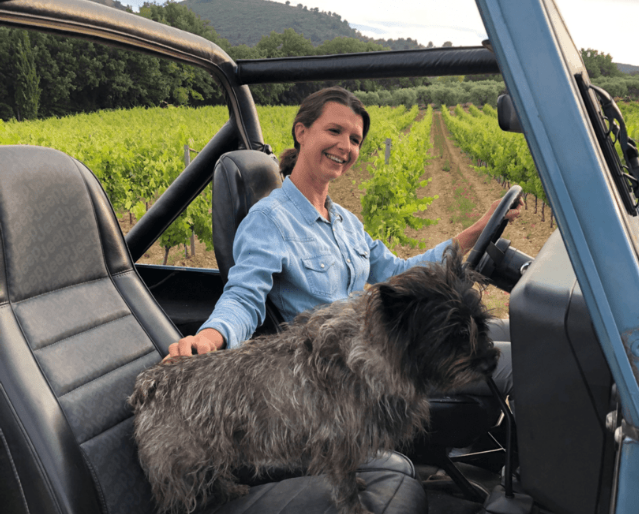
For the seventh in Le Figaro Vin’s series of interviews, we travel to the heart of the Luberon, in Provence, where Valentine Tardieu-Vitali, #44, has set herself the task of taking Château La Verrerie’s already impressive wines to an even higher level.
Le Figaro Vin: How does it feel to be crowned a winemaking champion?
Valentine Tardieu-Vitali: Taking on the challenge is energising in itself. Plus, it’s a feather in my cap. But you can never switch off if you want to stay at the top level. You have to stick to a rigorous regime.
Have you been training for long?
For a good ten years.
Wow! And always training with the same intensity?
Always the same intensity and no easing off.
How long do you train for on a daily basis?
For ten hours at least.
Every day, seven days out of seven?
No no, not seven out of seven, you must take the occasional break. I need to step back from time to time to get some perspective.
Five days out of seven then?
More like six days out of seven. Almost always.
And when you are competing – during the harvest?
Then I am busy day and night, seven days out of seven. It’s even more intense then. I become completely single-minded, exclusively focused on the quality of the harvest. Nothing else matters, nothing can distract me.
So you cut yourself off completely? Your sole focus is the competition?
Yes, it’s my only option. I have to win.
Who is your mentor?
I have a viticultural adviser and a vinicultural adviser, which makes two. And then I seek to talk things through with other leaders in the field, so we can share our knowledge, experience, and perspective.
Who are the other winemaking champions that you converse with the most?
First of all there’s my husband, Bastien Tardieu. I have other friends in wine who work at a very high level, particularly from Châteauneuf-du Pape. I also consult with Sylvain Morey, a colleague from our appellation.
Is wine a team sport?
Without any question. On your own, without a team, you are nothing. It’s through the choreography of each separate movement, repeated to the point of perfection, that you are able, step by step, to reach the heights. That’s the job I take on as team captain. I have to identify my players’ individual skills then put them in the positions where, with the right support, they can achieve their full potential.
What is the key to making a good wine? The terroir or the team captain?
The terroir is a triptych, with the human at the centre, the climate and the soil on either side.
To whom or to what do you owe your success?
I think it has a little bit to do with luck. As for whom? I would have to say Christopher Descours, because he trusted me to run La Verrerie estate, even though I was young and a woman! And then, underpinning everything, I have had to work for it.
When did you first fall in love with this sport?
When I was 16. I lived in Libourne, close to Saint-Émilion, where I went to see what this sport was all about. It was love at first sight and I’ve never looked back.
Do you ever dream of playing for Saint-Émilion?
No, I am happy where I am. I really love the Luberon appellation, which is still relatively undiscovered, and a natural environment. The approach to nature in the Luberon is markedly different from that in Saint-Émilion.
Are your parents proud of you?
I hope so, but that’s not what motivates me.
Who is your biggest supporter?
Christopher Descours.
Your favourite colour?
Red, because it is much trickier to master.
Your favourite wine?
Le Grand Deffand, because you have to give it everything you’ve got. It competes at an elite level, has an exceptional blend, and achieves outstanding results.
Have you won a lot of trophies with Le Grand Deffand?
I couldn’t care less about trophies. Nevertheless, it is beginning to win some. More importantly, it’s beginning to make its name. That’s why I really love this wine. On top of that, it’s quite unique.
How would you describe it in three words?
I would say it has elegance, subtlety, and soul. It has a soul precisely because so many people have contributed to its success, and that shows.
Your favourite vintage?
2006.
Why?
Because the wine is extremely subtle. It’s like velvet on the tongue and it ages really well. And, by no means least, because this vintage didn’t enjoy the greatest of critical receptions, which now gives it the element of surprise.
How do you see the rest of the 2023 season panning out?
I think we are well prepared even if, as things stand, we are always worried about drought. But we are constantly finding better and better ways to cope with the hazards of climate change.
Do you agree that the quality of your league increases with every season?
Yes, but then I also become more and more demanding. We have to be even better prepared and control every part of our performance. So yes, inevitably, we have to up our training even further, and perhaps I have to be more selective when it comes to picking my team.
Is the transfer market faring well?
It’s complicated. My teams are actually pretty well settled, but I would still like to build a bit more for the future and try to integrate more young players.
Do you have a mascot?
Of course, we have Marguerite. She is an eight-year-old Cairn Terrier and the mascot for La Verrerie. She supports us every day and she is always there, at every stage.
In an attempt to squeeze every last drop out of summer, this week’s Listed section features Wine Lister’s top 5 rosés by Quality score. Whilst the Côte d’Azur might seem a long way away, these five Provençal wines serve as a reminder of warmer climes and long sunny days.
Wine Lister’s Quality score measures a wine’s performance across two criteria – critics’ scores and ageing potential. Whilst these wines perform relatively well with the critics, they are not built with longevity in mind, and have an average predicted drinking window of just three years – compared to 17 and 16 years respectively for the top five whites and reds for Quality.
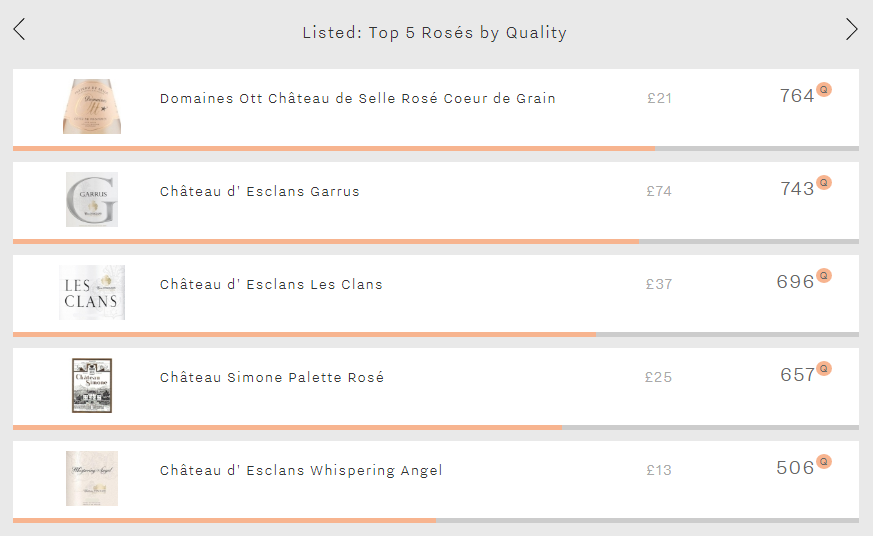
Domaines Ott Château de Selle Rosé Coeur de Grain tops the table with a very strong Quality score of 764. Currently priced at around £21 per bottle (depending on the retailer), it is the second-cheapest of the five, and represents excellent value for money.
Garrus, the first of three wines from Château d’Esclans, comes next with a Quality score of 743. At £74 it is by far the most expensive of the group – over twice as expensive as is its close relative Les Clans, with a Quality score of 696. Both these wines divide the critics, performing well with Antonio Galloni and Jancis Robinson, but less favoured by Bettane+Desseauve.
In fact, the French duo are considerably less enamoured with these five rosés than Jancis Robinson in general. Perhaps still rosé has a way to go before it is considered a serious vinous offering in France.
Château Simone Palette Rosé fills the fourth spot with a score of 657, followed by a third wine from Château d’ Esclans – Whispering Angel. Whilst it has a modest Quality score of 506, and is by far the least expensive of the group, it has by far the best Brand score (805). Proof that formidable branding can propel a wine beyond where its intrinsic quality level might suggest (though we certainly wouldn’t turn our noses up at a chilled glass of Whispering Angel on a sunny day like today).




